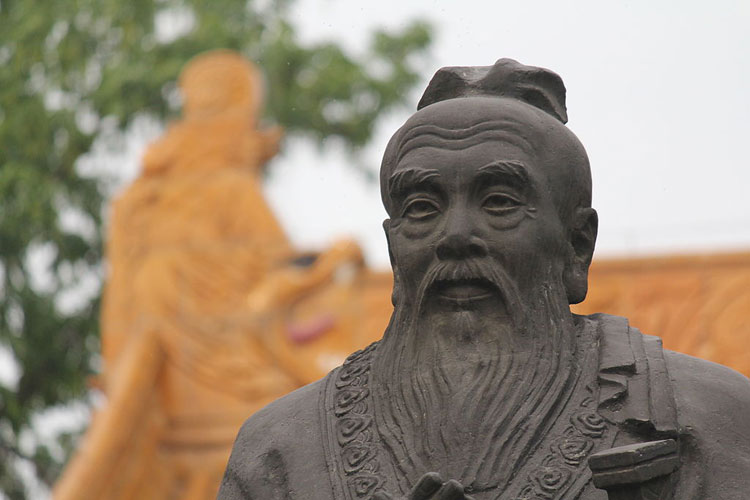Common questions on Confucianism religion with answers
There are common questions on Confucianism religion (Ruism) and Confucianism beliefs and Philosophy with answers From the Ruism religion’s standpoint.

1- What does Confucianism believe in?
Confucius believed that all people–and the society they live in—benefit from a lifetime of learning and a moral outlook. Confucius was a Chinese philosopher, politician, and teacher whose message of knowledge, benevolence, loyalty, and virtue was the main guiding philosophy of China for thousands of years.
2- What is Confucianism’s summary?
Confucianism is a philosophy based on mutual respect and kindness toward others. It was developed to bring peace and stability to society. It was founded before the birth of Confucius, developed through his later life, and was made popular soon after, during the Han Dynasty.
3- Why is Confucian important?
Confucianism is often characterized as a system of social and ethical philosophy rather than a religion. In fact, Confucianism built on an ancient religious foundation to establish the social values, institutions, and transcendent ideals of traditional Chinese society.
4- Does Confucianism have a God?
Although Confucianism became the official ideology of the Chinese state, it has never existed as an established religion with a church and priesthood. Chinese scholars honored Confucius as a great teacher and sage but did not worship him as a personal god. Nor did Confucius himself ever claim divinity.
5- What is the main philosophy of Confucius?
The philosophy of Confucius, also known as Confucianism, emphasized personal and governmental morality, the correctness of social relationships, justice, kindness, and sincerity.
6- Who Confucianism worship?
The family is at the heart of Confucian philosophy. It is within the family that individuals learn how to live well and become good members of the wider community. Ethical living involves deep reverence for parents and worship of the spirits of ancestors.
7- What are some practices of Confucianism?
There are six main beliefs in Confucianism, these include:
- Jen: Benevolence, humanness towards one another, it’s the most important Confucianism virtue.
- Yi: Righteousness.
- Xin: Honesty and Trustworthiness.
- Chung: loyalty to the state, etc.
- Li: includes ritual, propriety, etiquette, etc.
- Hsiao: love within the family, love of parents for their children, and love of children for their parents.
8- What is the holy book of Confucianism?
There are several holy books in Confucianism however Lun Yu (Analects) is the most revered. It wasn’t actually written by Confucius, but instead the second generation of his students. The book is based on his sayings and captures what Confucianism is supposed to be about.
9- What does Confucianism mean?
It’s a system of ethics, education, and statesmanship taught by Confucius and his disciples, stressing love for humanity, ancestor worship, reverence for parents, and harmony in thought and conduct.
10- What happens after death in Confucianism?
Unlike Taoist and Buddhist philosophies, the Confucian emphasis on death is through living one’s life. An individual should follow a moral stand (propriety, filial piety, appropriateness, and humanness) and this stand should be continuous even in the last moment of life.
11- What are the main teachings of Confucianism?
The most important of these teachings include Jen, or “humaneness;” I, or “righteousness;” li, or “propriety/ritual;” and hsing, or “human nature.” Hsiao, or “filial piety,” is also a vital concept, one that is central for young people growing up in the Confucian tradition.
12- What did Confucianism teach?
Confucius, also known as Kong Qui or K’ung Fu-Tzu, was a Chinese philosopher, teacher, and political figure. His teachings, preserved in the Analects, focused on creating ethical models of family and public interaction and setting educational standards.
13- What are the 5 teachings of Confucius?
The Five Virtues is:
Jen – Goodwill, empathy, generosity…
Yi – Rightness, duty as guardians of nature and humanity…
Li – Right conduct and propriety, demonstrating your inner attitude with your outward expressions…
Chih – Wisdom…
Hsin – Faithfulness and trustworthiness…
14- What are the core values of Confucianism?
Confucian teaching rests on three essential values: Filial piety, humaneness, and ritual. The Confucian value system may be likened in some ways to a tripod, which is one of the great vessels of the Shang and Zhou Period and a motif that reoccurs in later Chinese arts.
15- Which is Confucius’s golden rule?
Five centuries before Christ, Confucius set forth his own Golden Rule: “Do not impose on others what you do not wish for yourself.”
16- What does neo Confucianism mean?
“Neo-Confucianism” is the name commonly applied to the revival of the various strands of Confucian philosophy and political culture that began in the middle of the 9th century and reached new levels of intellectual and social creativity in the 11th century in the Northern Song Dynasty.
17- Is Confucianism practiced today?
Confucianism is still practiced mainly in Eastern China around its hearth. However, its domain and sphere still extend to the north and south into countries like North and South Korea, Taiwan, and Vietnam.
18- What did Confucius say about government?
Confucius promises a government that cares for the people, which makes their well-being its primary concern. This is to govern by virtue. And virtue creates its own legitimacy: paternalistic, affectionate care of the people by the rulers is sure to be reciprocated by the people’s trust and obedience.
19- How did Confucian affect the Chinese government?
Confucianism It helped produce well-trained government officials and helped society by making a code of conduct so they will be organized. What actions by Sui and Tang emperors helped unify China? Sui emperor Wendi let people keep there own belief systems.
20- How did Confucianism shape Chinese society?
Confucian brought stability into a country which had been effected in many ways from previous changeovers in dynasty. Ancient China also shows it was valued due to its being kept in practice until the end of the Ancient Chinese era and beyond. Confucius believed that every person had there place in society.
21- What is Confucian law?
In the philosophy developed by Confucius and his followers, the law played a secondary role in shaping human behavior. Confucian scholars believed that human beings were inherently good and nature endowed them with four fundamental virtues: Humanity (仁), Righteousness (義), Propriety (禮), and Wisdom (知).
Read Also:
Confucianism religion | History, Beliefs, god, & More…
Confucianism beliefs What are the important beliefs of Ruism?
Confucianism religion | Common questions on Ruism Part 2
Confucius Quotes | 194 inspirational quotes and sayings
Zoroastrian faith | Common questions on Zoroastrianism
Jain religion | Common questions on Jainism Part 1/2
Jehovah’s Witness Religion | Founder, Enter Adventism, Exit Adventists



